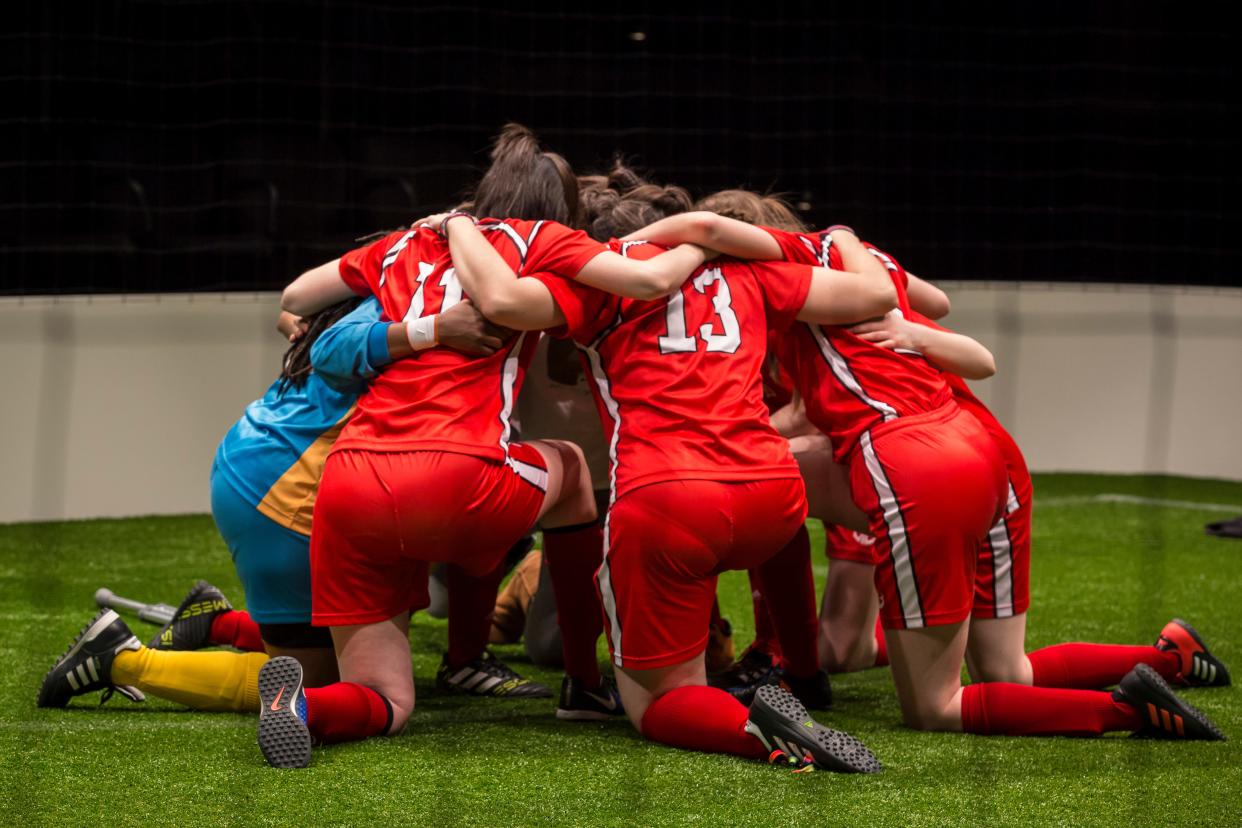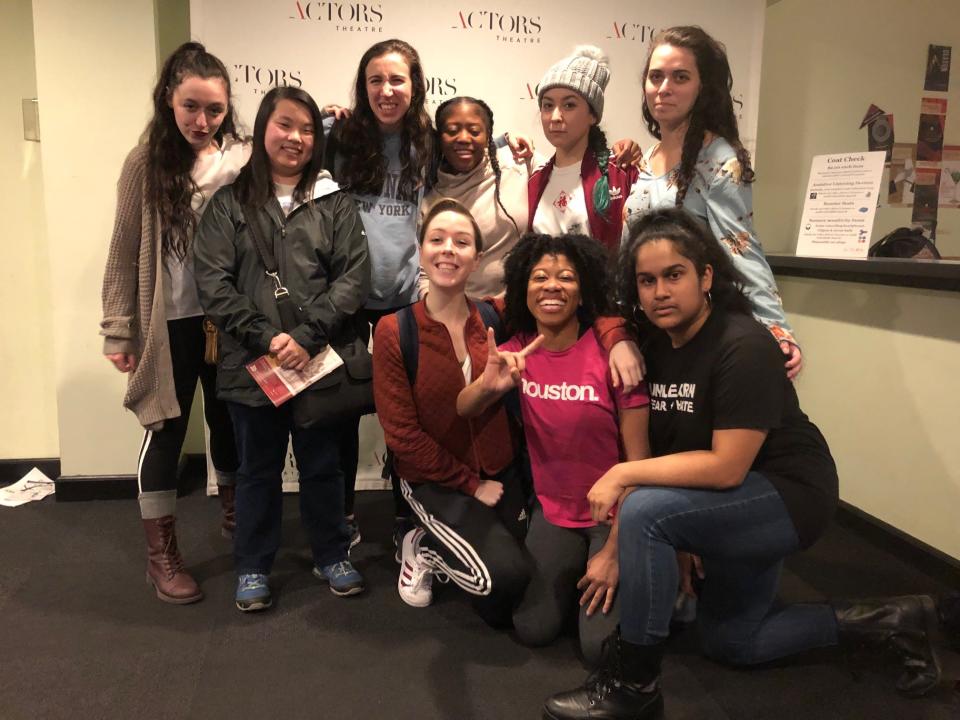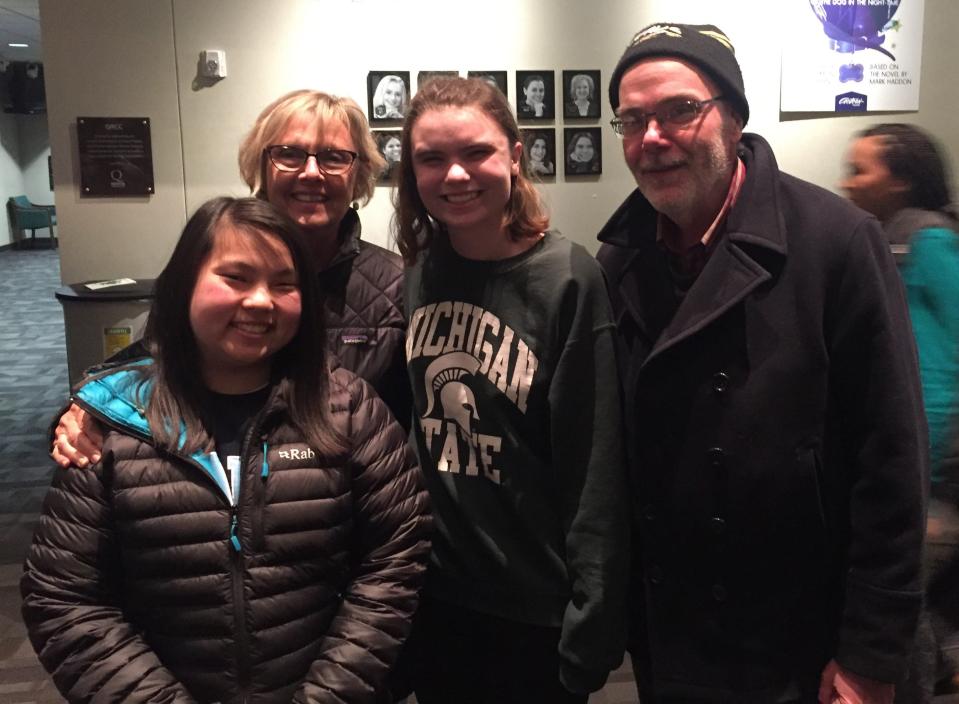'The Wolves' is unlike any play my daughter and I have seen, which is why we’re about to see it for the 18th time

The howl we heard six years ago has not stopped resounding in our lives.
In 2018 my adult daughter Zoe and I saw a play called “The Wolves” at Chicago's Goodman Theatre. We knew only that Sarah DeLappe’s drama was about a teenage girls’ soccer team. We first heard about the production in an email from the Chicago Red Stars, a women’s professional soccer team that we support.
But seeing the Goodman stage set up like an indoor soccer field with netting was our first clue that we would see something special.
And we did, starting with nine young women and no men on stage. No matter how many plays you attend anywhere in the United States, it’s exceedingly rare to experience that configuration of people.
For the next 90 minutes, we watched them stretch, warm up, run passing drills and slam balls off the netting while they kibitzed, laughed, and argued about a zillion topics including tampons, mass murder in Cambodia, the unlikely military exploits of their worthless coach — and how a terrible accident might have been prevented.
After the final scene, when the girls broke their huddle in startling fashion, we left feeling like a hard-charging striker had bowled us over, but in a good way.
We both wanted to see that again. And so we have.
To date, Zoe and I have attended 17 different professional, collegiate and community theater productions of “The Wolves,” driving as far as Cincinnati; Louisville, Kentucky; and Columbus, Ohio. That number would be even higher, but the COVID-19 pandemic canceled some shows we would have seen.
While we’ve enjoyed several collegiate performances in Wisconsin, we will finally get to see a local professional production when Milwaukee's Renaissance Theaterworks stages “The Wolves” beginning Jan. 19.
This seems like a good opportunity to explain what makes this one play worth seeing so many times, and what effect this experience has had on us.
Showcasing physicality, not sexuality
“The Wolves” opens in media res, with the nine teammates warming up before a soccer match in their indoor winter season. Juniors in high school, many of them hope to catch the eye of a scout who can get them a college scholarship.
While they attend two different schools, they have played with each other on this indoor team for years, except for the new girl, #46, who’s home-schooled and socially awkward.
DeLappe refers to the characters by uniform number, not name. The only character whose ethnicity is specified is #14, who is part Armenian (it’s a comic plot point). This facilitates diverse casting; my Asian daughter has been delighted to see Asian actors in many different “Wolves” roles.
This naming convention also works with DeLappe’s statement that she wrote the play like a war movie. Like an infantry squad in such a film, each player has a hook. But the hooks are character-based rather than ethnic. #13 is a stoner and comedian, #11 is brainy, #2 is an earnest do-gooder.
The striker, #7, performed by different actors in various shades of alpha female and mean girl, conflicts with #25, a defender who is team captain and de facto coach, since their paid adult male coach is a loser. #14 is #7’s attentive sidekick, but pay attention to what happens to this relationship.
Remarkably, in a brisk 90-minute play, DeLappe finds ways for every girl to be seen and for each one to be in conflict with at least one teammate, though the goalkeeper #00’s most intense conflict is with her own performance anxiety.
At least three characteristics make “The Wolves” stand out for me.
First, it showcases the physicality of young women without sexualizing them. Even in warmups and drills, they’re athletes showing off movements and skills few of us possess. Their actions onstage lead us to admire their bodies and their command of them.
Next, it aces the crucial parts of the Bechdel test, nine times over. The girls have many conversations with each other, frequently overlapping, that have nothing to do with boys or men.
Finally, “The Wolves” is a realistic group portrait of what teenage girls this age are actually like (given that they’re suburban girls whose parents can afford the fees for them to play indoor soccer). My daughter played sports, and I spent significant time around teams of teenage girls. Traits and concerns we might stereotypically associate with adolescents are not evenly distributed. One team member in “The Wolves” is sexually active, another is experiencing the beginning of a same-gender attraction. But others evince no interest in sex or romance. They’re more concerned about homework, or about which friend has a login and password so they can watch “Game of Thrones.”

Any character can be the one who stands out
Among her many other good decisions, DeLappe avoids the fatal flaw of sports dramas: a climactic final game scene. These almost never work, especially on stage, where it is impossible for the action to be convincing.
DeLappe’s script specifies that team members perform exercises and drills “in perfect union and with military precision.” But excluding one scene, she does not spell out what those movements must be. That leaves room for directors to work. While the actors need not be soccer players for “The Wolves” to succeed, the more soccer skill they can infuse, the better the performance is. The Goodman actors and some other subsequent casts, including Renaissance's, have gone through short training camps or worked with coaches.
In one key scene new girl #46, upset about the mockery she’s been getting, sings a made-up ditty while juggling a soccer ball. In a Northwestern University production, Marissa Ferrara, the actor playing #46, put on a stunning display, keeping the ball in the air with her feet and knees while singing. When Ferrara did this, I heard a loud gasp behind me. When the show ended I checked in with the gasper, who turned out to be a classmate of the actor. I had no idea she could do that, the classmate told me.
While #46 is often the center of attention, an actor's performance can make any character stand out in "The Wolves." In the Goodman's production, I was taken with how Isa Arciniegas brought to life #25, the dogged captain leaning on the cliches she learned from her father while quietly undergoing a major personal change. She's become the standard by which I evaluate all other captains in "The Wolves."
At Actors' Theatre Grand Rapids in 2019, we first saw an actual high school student playing one of the Wolves. Kyla Kralapp portrayed #2, the earnest achiever who also has an eating disorder. Kralapp fit in perfectly in this production, which had a mix of ages and a powerful viscerality. Of all the performances I've seen, this was the one where I most believed two characters about to fight really were going to fight.

With 10 actors, including one who only appears in the final scene, "The Wolves" is not a cheap play for professional companies to produce — and for maximum impact, I think it needs to be staged in a space where audience members are close to the action, limiting how many tickets can be sold.
Renaissance is staging its Milwaukee production in partnership with First Stage's Young Company, a troupe of advanced teen actors. So they'll be playing characters their own age, confronting the same questions, challenges and adult inanities they face in their offstage lives.
Given discussion of abortion and also some harsh language in "The Wolves," I doubt you will ever see a high school production of it around here. But it has become a popular play for college theaters to stage (we've seen it at Marquette, UW-Madison and UW-Parkside) because of its many quality roles for women.
Why do we keeping doing this?
When I describe our "Wolves" excursions to friends and acquaintances, some want to know if we are having soul-baring father-daughter conversations. We do talk about things. But having experiences matters far more to Zoe, a woman of few words, than analyzing them verbally with me.
This started out as seeing a single performance that combined two of the things that matter most to Zoe: women's sports and theater. It has grown, a show at a time, into a quest and a challenge that continues to reward us, aesthetically and emotionally. We bond through the planning, the traveling, the finding of other things to do in a new town — and seeing the show.
Even as a child, my daughter was a person of strong interests. One year in grade school, she and her classmates were assigned to do book reports on a biography of a person of their choice. Zoe was fascinated with Yao Ming, the Chinese basketball star who had recently begun playing in the NBA. But no book had been written about Yao at that time. So with her teacher's permission, I compiled a collection of articles about Yao. Zoe wrote her book report about that.
I remember telling her once that sometimes it can be hard to find other people to share one's cultural passions. How grateful I am to share this unusual pursuit of "The Wolves" with her.
Because the script and story are almost second nature to me now, seeing a new "Wolves" becomes an opportunity to absorb and think about every aspect of putting on a play, including ancillary stuff like promotional illustrations and the pre-show recorded music — Beyoncé's "Run the World (Girls)" is a frequent choice.
As a person recovering from an eating disorder, I've become deeply invested in #2's struggles with food and body image. (It's worth noting that her expressed insecurity is not about beauty, but about not appearing powerful or intimidating.)
I've enjoyed seeing how directors and actors interpret DeLappe's vision. In a Lewis University production in Romeoville, Illinois, Haley Marchewka, the actor portraying the anxiety-ridden goalkeeper, wore headphones throughout the play — a choice that fit her character and paid off big during the final scene.
In this same production, the director had all the actors onstage tilt their heads in the same direction as #46 talked about a bird in the soccer dome — the kind of little touch that enhances a show.
We've seen decisions we didn't appreciate, too, including a college production that inserted several additional characters and filler lines of dialog.
Seeing many different "Wolves" has convinced me there is more than one way to perform any character or stage any play.
While some of our civilian friends think we're a little kooky, theater people who learn about our quest are delighted. Actors who perform the roles of "The Wolves" have been gratified by the support of Zoe, an audience member their own age.
We have followed some of them into other roles, seeing Ashley N. Hildreth, a comic star of Actors Theatre of Louisville's "Wolves," be just as funny off-Broadway in "The Play That Goes Wrong." Last March we drove to Cape Girardeau, Missouri, to watch the world premiere of "The Winter Guard Play," written by Avery Deutsch, whom we enjoyed as #2 in both the Cincinnati and Louisville "Wolves."
In a world where so many stimuli compete for our attention, going deep into "Wolves" fandom has brought us much pleasure and many surprising experiences. Yes, that sounds like I am talking about sports.
Like the Brewers, Bucks, Packers, Wave and Marquette women’s basketball, “The Wolves” has become another team we root for.
If you go
Renaissance Theaterworks performs "The Wolves" Jan. 19-Feb. 11 at 255 S. Water St. For tickets, visit www.r-t-w.com or call (414) 278-0765.
This article originally appeared on Milwaukee Journal Sentinel: 'The Wolves' is like no other play, and Milwaukee will soon find out why
Solve the daily Crossword

